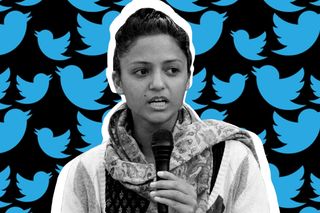
Why We Should Care That Shehla Rashid Quit Twitter
A platform for public discourse has been weaponized.

Yesterday, Shehla Rashid, the JNU student activist, announced that she had left Twitter. Whether you agree or disagree with her politics, this news should be deeply troubling.
With more than 400,000 Twitter followers, Rashid had a captive audience of fellow activists, journalists, feminists, anyone who finds value in her efforts to affect social change. She also was consistently and systematically trolled by organized armies of right-wing haters, who filled her notifications with sexist, violent, and personal attacks. Rashid wrote last year of the toll this trolling was taking on her health and sense of well-being, and finally, two days ago, she announced she was leaving the platform. Twitter, she argued, “is not only bad for democracy, it’s bad for me.”
This announcement should worry us in ways that have nothing to do with whether you agree with Rashid’s politics, or think her critics have any merit. The problem is bigger than Rashid and even bigger than the political operatives hired to bring her down. Her departure is clear evidence that these platforms are successfully being hijacked and misused in an organized way to eliminate political dissent. Rashid was not challenged by peers at JNU who disagreed with her views and wanted to engage her earnestly; rather, she was the target of well-funded and organized efforts to attack and silence dissenting (in this case, left-wing) voices. Reports of political propaganda machines that employ armies of professional trolls are no longer the stuff of Netflix political drama — they are real, verified tools of our governments; the open secret no one will admit to, but everyone knows exists.
For every Sheila Rashid, who spent years publicly speaking against injustice and building her Twitter following to the point where it has real power, there are unknown numbers of hired guns who have been hired specifically to target her and bombard her with threats and abuse. Rashid, like any human being, could only be the target of that torrent for so long before she decided withstanding it was no longer tenable. That assault, watched by others, discourages anyone else from replacing her in the discourse. Systematically, the number of dissenting voices dwindles.
Twitter, Facebook, Instagram, and WhatsApp have collectively come to almost exclusively dominate how people around the world consume and exchange ideas and perspectives about their culture, society and governments. These platforms have the power to amplify voices that would not have had the same power without before the existence of social media. But the platforms, in refusing to address the rampant and systemic issue of online harassment and trolling, have become co-opted by people with the means and desire to stamp out healthy public discourse.
This isn’t about just one woman’s decision to leave social media. It’s not about ‘digital detox.’ This news should trouble us because it shows us that the very platforms we depend on for social connectivity and discourse have become corrupted, manipulated in intellectually violent ways. If the very voices we follow because they further those dialogues are silenced, social media platforms cease to serve their intended purpose, or provide value to society. But for a generation who learns, explores, communicates, and advocates on digital platforms, will we know how to have engaged civic discourse without them?
Related


GQ Awarded Serena Williams “Woman” Of The Year But Put Her Gender In Quotation Marks
